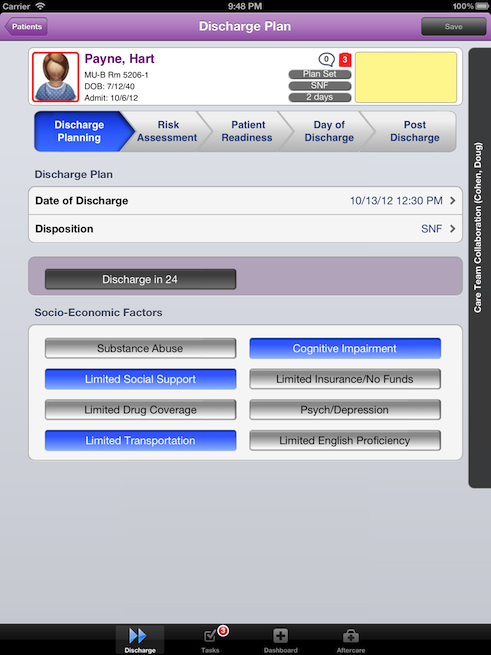 With Medicare no longer reimbursing hospitals for certain preventable readmissions within 30 days of discharge, the onus now is on providers to improve transitions from acute to ambulatory and home care. Some hospitals are turning to mobile apps to improve communications during patient handoffs, as attendees at the sixth annual Health 2.0 Conference in San Francisco learned Monday.
With Medicare no longer reimbursing hospitals for certain preventable readmissions within 30 days of discharge, the onus now is on providers to improve transitions from acute to ambulatory and home care. Some hospitals are turning to mobile apps to improve communications during patient handoffs, as attendees at the sixth annual Health 2.0 Conference in San Francisco learned Monday.
Marin General Hospital in Greenbrae, Calif., has recently gone live in its cardiac specialty unit with communications functions of Carebook, mobile care collaboration software from San Francisco-based startup CareInSync. Next Monday, the hospital will start using evidence-based checklists on the app, containing to-do lists for patient discharge, specific to each member of the care team's role, according to Marin General Medical Director Dr. Susan Cumming.
Later, Marin General will implement a third phase, the generation of patient-friendly discharge documents. The hospital started with secure texting for better communication, however, because clinicians had not been using mobile communications other than old-fashioned pagers. "Some older docs are not used to texting," Cumming told MobiHealthNews.
Physicians mostly are using the app on iPhones, while support staff have access from iPod touch devices and case managers from iPads, said Cumming, a hospitalist who has practiced internal medicine in outpatient settings.
She reported that the hospital turned to Carebook because the app incorporates principles from Project RED (Re-Engineered Discharge), a federally funded research group at Boston University Medical Center that seeks to cut the number of rehospitalizations by focusing on patient safety during the initial discharge process.
The hospital was looking for a way to get buy-in from clinicians without creating a lot of extra paper in an effort to foster multidisciplinary, team-based collaboration. "We have been able to use the tool to accomplish some efficiency goals, which made our CFO happy as well," Cumming added. Or at least that is the idea once the implementation is complete.
Carebook automatically calls each patient's caregivers and family when a hospital physician signs a discharge order and provides instructions to primary care doctors and laypeople on managing the discharge and transition.
Siva Subramanian, founder and CEO of CareInSync, said that the app has drawn on the work of Dr. Atul Gawande, the Brigham and Women's Hospital surgeon who authored "The Checklist Manifesto," which called for hospitals to implement standardized checklists for common procedures, including hospital discharge. "We've taken Gawande's vision and brought it to life with software," Subramanian said.
Subramanian also gave a pitch to the venture capitalists in the audience. CareInSync raised $1.6 million from HealthTechCapital in June and, like so many other companies showcased at Health 2.0, is looking for additional funding. Marin General, which separated from Sutter Health in 2010 and is now run by a public agency in Marin County, Calif., CareInSync's first customer since the product moved out of beta.
Gawande also came up in a presentation about patient-provider communication, the first of two such sessions at this conference. Careticker, a Miami-based company founded by longtime healthcare entrepreneur Chiara Bell, demonstrated Knocked Up, an iPhone app for expectant and new mothers that includes checklists for patients going into the hospital to give birth and for safe recovery at home. Patients can conduct secure, online chats with their physicians and doctors can customize the checklists for their patients.
Bell said that perhaps half of women who give birth in a hospital may go home without a plan to care for their newborns, so Knocked Up lists include reminders to connect with a pediatrician and to stay in touch with the OB/GYN.
"As a physician, Atul Gawande's 'Checklist Manifesto' has become kind of our bible," added the session's moderator, Dr. George Margelis, the Australia-based Asia-Pacific general manager for Intel-GE Care Innovations.
Careticker also is working on a checklist-centric app for post-discharge orthopedic care. The name? Knocked Down.














